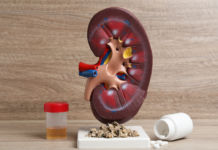For Educational Purposes Only.
A kidney stone is a hard-crystalline mineral formed within the kidney or urinary tract1. The medical term for a kidney stone is called nephrolithiasis, and about 1 in every 20 people will develop kidney stones at some point in their life. They form when there is a decrease in urine volume and/ or an excess of stone forming substances in the urine1. It is important to not become dehydrated, as this is a major risk for developing kidney stones. Symptoms can include severe pain in the flank, abdomen, groin and blood in the urine. Diagnosis can be done by ultrasound or CT scan, and most stones will pass through the ureter to the bladder on their own with time. Treatments can include medicine to help with the pain as well as medications to facilitate the passage of urine.
They form when there is a decrease in urine volume and/ or an excess of stone forming substances in the urine1. It is important to not become dehydrated, as this is a major risk for developing kidney stones. Symptoms can include severe pain in the flank, abdomen, groin and blood in the urine. Diagnosis can be done by ultrasound or CT scan, and most stones will pass through the ureter to the bladder on their own with time. Treatments can include medicine to help with the pain as well as medications to facilitate the passage of urine.
Anyone may develop a kidney stone, but people with certain diseases and conditions or those who are taking certain medications are more susceptible to their development. Urinary tract stones are more common in men than in women. Most urinary stones develop in people 20 to 49 years of age, and those who are prone to multiple attacks of kidney stones usually develop their first stones during the second or third decade of life2. People who have already had more than one kidney stone are prone to developing further stones. A family history of kidney stones is also a risk factor for developing kidney stones. Kidney stones are more common in Asians and Caucasians than in Native Americans, Africans, or African Americans3. A small number of pregnant women develop kidney stones, and there is some evidence that pregnancy-related changes may increase the risk of stone formation3. Factors that may contribute to stone formation during pregnancy include a slowing of the passage of urine due to increased progesterone levels and diminished fluid intake due to a decreasing bladder capacity from the enlarging uterus3.
The most common type of kidney stone contains calcium in combination with either oxalate or phosphate4. There are a lot of different medical conditions that can lead to an increased risk of developing a kidney stone. Gout/hyperuricemia is the term for chronically increased amount of uric acid in the blood and urine, and can lead to the formation of uric acid kidney stones5. Hypercalciuria (high calcium in the urine), another inherited condition, causes stones in more than half of cases5. In this condition, too much calcium is absorbed from food and excreted into the urine, where it may form kidney stones5. Chronic diseases such as diabetes and high blood pressure are also associated with an increased risk of developing kidney stones5.
Most kidney stones eventually pass through the urinary tract on their own within 48 hours6, with fluid intake. Ketorolac, an injectable anti-inflammatory drug, and narcotics may be used for pain control when over-the-counter pain control medications are not effective6. Since there are no proven home remedies to dissolve kidney stones, acetaminophen may be used as pain medication if there is no contraindication to its use6. For kidney stones that do not pass on their own, a procedure called lithotripsy is often used6. In this procedure, shock waves are used to break up a large stone into smaller pieces that can then pass through the urinary system6. Rather than having to undergo treatment, try to avoid kidney stones in the first place. It can be especially helpful to drink more water, since low fluid intake and dehydration are major risk factors for kidney stone formation.
Sponsor: Kibow Biotech® 
References
- Stöppler, M. C. (na). Kidney Stones: Early Signs, Symptoms, Causes, Pain, Treatment & Surgery. Retrieved fromhttps://www.medicinenet.com/kidney_stones/article.htm
- Stöppler, M. C. (na). Kidney Stones: Early Signs, Symptoms, Causes, Pain, Treatment & Surgery. Retrieved fromhttps://www.medicinenet.com/kidney_stones/article.htm
- Stöppler, M. C. (na). Kidney Stones: Early Signs, Symptoms, Causes, Pain, Treatment & Surgery. Retrieved fromhttps://www.medicinenet.com/kidney_stones/article.htm
- Stöppler, M. C. (na). Kidney Stones: Early Signs, Symptoms, Causes, Pain, Treatment & Surgery. Retrieved fromhttps://www.medicinenet.com/kidney_stones/article.htm
- Stöppler, M. C. (na). Kidney Stones: Early Signs, Symptoms, Causes, Pain, Treatment & Surgery. Retrieved fromhttps://www.medicinenet.com/kidney_stones/article.htm
- Stöppler, M. C. (na). Kidney Stones: Early Signs, Symptoms, Causes, Pain, Treatment & Surgery. Retrieved fromhttps://www.medicinenet.com/kidney_stones/article.htm




